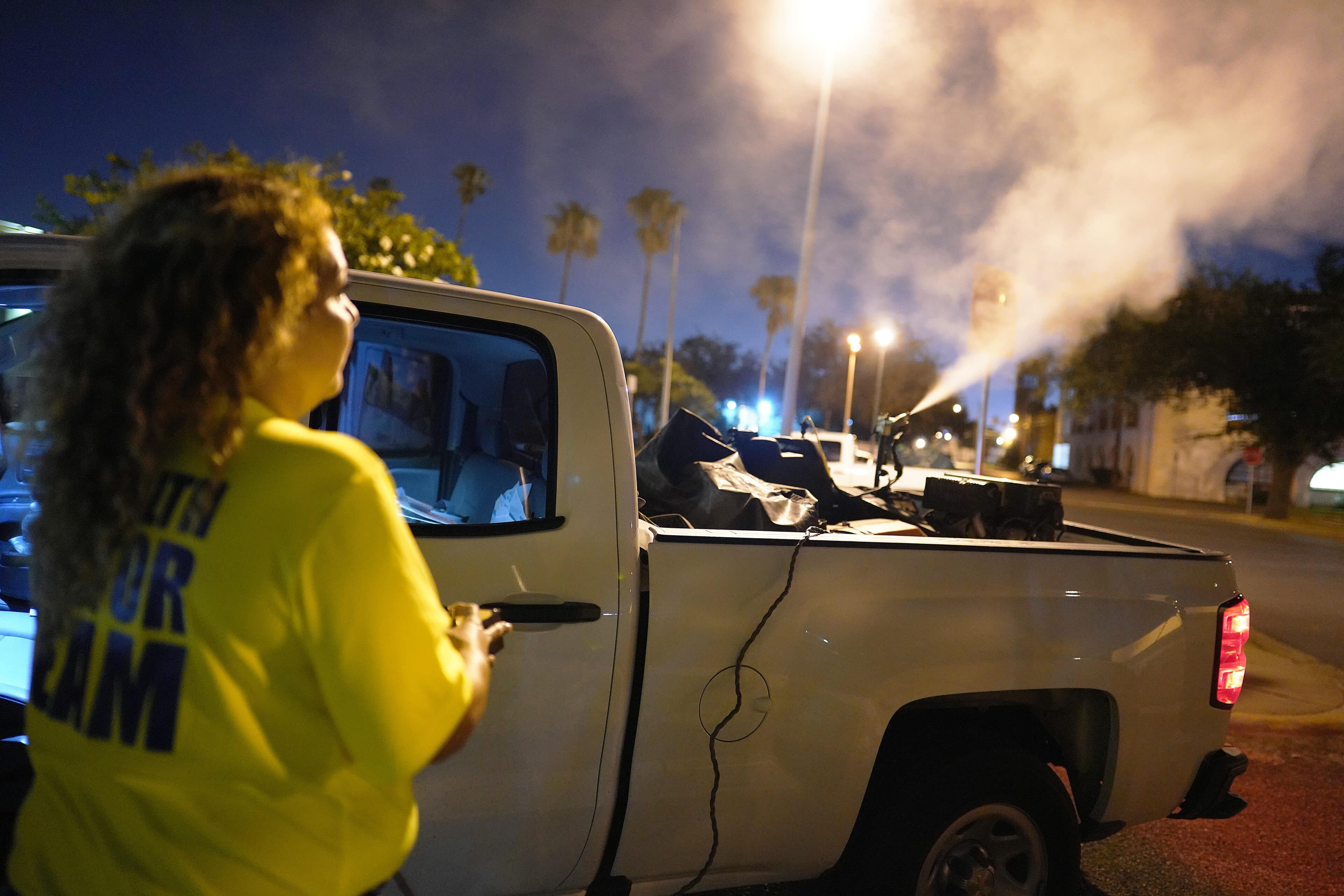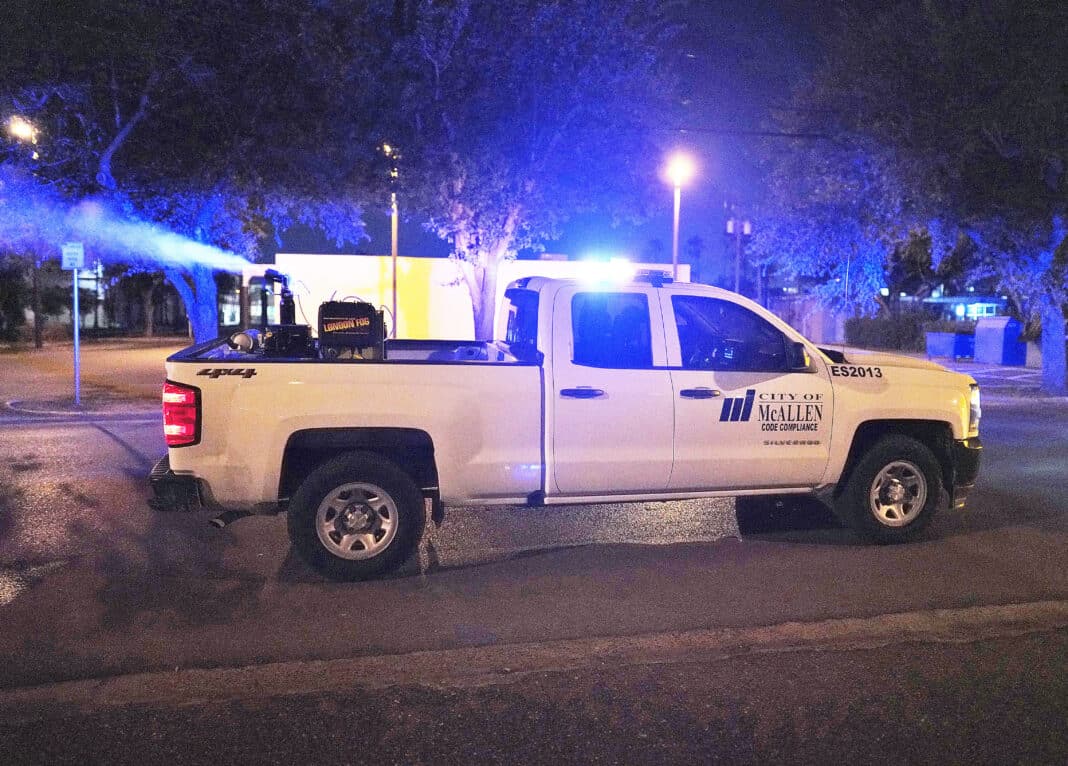BY ALEJANDRA YAÑEZ AND XAVIER ALVAREZ | STAFF WRITERS
The warmer months often bring rains and rising temperatures which create the perfect breeding grounds for mosquitoes to thrive in stagnant waters, especially in a subtropical climate such as the Rio Grande Valley.
To combat these pests, the city of McAllen’s Environmental Health and Code Enforcement Department have begun spraying areas with a high population of mosquitoes.
The slow moving trucks equipped with tanks filled with a mix of Permethrin, the most commonly used insecticide, and oil or water, drive late at night into the early morning to avoid traffic and pedestrians.
Ten individuals within the department are licensed by the Texas Department of Agriculture to spray the insecticide as part of state regulation.
“Another state regulation is that we can not spray if wind speeds are greater than 10 miles an hour,” Steven Kotsatos, director at Environmental Health and Code Enforcement, said Thursday. “We don’t want the insecticide drifting … we want to go down the center of a street or an alley and let the spray stay there and rise up.”
Kotsatos also said they rotate through different chemicals in order to fight any insect that might have grown resistant to a specific pesticide and are currently in the process of rotation.
In addition to the city’s efforts to control mosquito breeding, the University of Texas at Rio Grande Valley’s Center for Vector-Borne Diseases, is constantly collecting larvae from McAllen and other areas along the eastern half of the U.S.-Mexico border to test their susceptibility to commonly used pesticides.

The city of McAllen collects mosquitoes from its areas to give to the lab by setting gravid traps which lure in mosquitoes that carry West Nile virus.
A gravid trap attracts female mosquitoes by creating an ideal environment for them to lay their eggs.
The trap creates an upward current of air to carry the mosquitoes from the pan into a collection bag.
Another method used by Valley collectors is a carbon dioxide trap which attracts mosquitoes by creating the illusion of a living animal with the use of dry ice.
Christopher Vitek, a UTRGV biology professor, said aside from the insecticide research, the university also regularly tests mosquitoes for diseases in the South Texas Mosquitoes Borne Diseases Surveillance Project, which is funded by the CDC.
Contrary to their bleak reputation as disease transmitters, only five of the 30 mosquito species in South Texas are disease vectors.
The UTRGV office of emergency preparedness attributes Aedes Aegypti mosquitoes or “dusk and dawn biters” as disease carriers in the Valley. This species can be identified by the insect’s white-shaped markings on its legs and thorax.
This species takes as little as a week to mature from an egg into adulthood and has a lifespan of about three weeks. Perhaps the biggest contributor to the Valley’s infestation is that Aedes Aegypti eggs remain viable for over a year in their dry state.
Meaning that even after the rains subside these mosquitoes may re-emerge.
The four most common vector-borne diseases transmitted by mosquitoes in South Texas are Dengue Fever, West Nile virus, Zika virus and Chikungunya virus.
Last year, the Valley had an upsurge of Dengue Fever and Zika cases.
West Nile has proven to be the most prevalent among the viruses on a year-to-year basis.
Despite the constant rainfall over the past several weeks, the Valley has not confirmed any cases of mosquito driven disease in its residents this year.
Dr. Ivan Melendez, the Hidalgo County health authority, said he predicts cases of mosquito-borne disease to begin rolling in within the next couple of weeks due to the excessive amounts of rain.
“I think it’s definitely a significant healthcare contributor,” Melendez said. “It’s definitely worrisome especially in areas where a lot of people are outside or don’t have air conditioning.”

As previously reported by The Monitor, residents should exercise caution when entering mosquito-prone habitats.
Some preventative measures include emptying or getting rid of any containers that may hold stagnant water such as cans, pots, pet dishes, gutters and discarded tires, which have been the subject of illegal dumping despite McAllen residents being allowed to dispose of five tires a month at the recycling center for free.
“It’s not only tires, even the brush that’s leftover from the February freeze is an issue,” Hidalgo County Public Affairs Director Carlos Sanchez said. “It can create stagnant pools of water.”
In addition, pools and hot tubs should be maintained, rain barrels should have screens and tall grass should be cut as these areas can be perfect environments for mosquitoes to lay eggs.
Mosquito briquettes and repellents can also be purchased from stores to help combat infestations.
When applying insect repellent residents should be wary of practicing proper use to avoid ingestion of insecticides. The most effective repellents are those which contain DEET, picaridin, oil of lemon, eucalyptus or IR3535.
Back in March, McAllen’s Environmental Health and Code Enforcement Department also began a monthly educational outreach program where the department goes out to different community centers to teach the public about the top 10 code violations, including dumping of tires, mosquitoes and tall grass and how it all ties into the environment.
These programs are conducted on the last Thursday of every month.
Residents can report mosquito complaints to McAllen’s 3-1-1 Customer Service Call Center by calling 311 or (956) 681-3111 from 8 a.m. until 5 p.m. or call McAllen Code Officer (956) 681-1900, which is available 24 hours a day.
([email protected] | [email protected])





